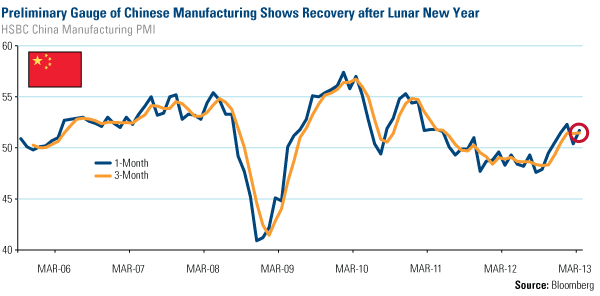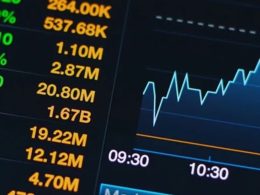Emerging Markets Radar (March 25, 2013)
Strengths
- The HSBC China March flash PMI was 51.7 which beat the market consensus of 50.8 and is better than 50.4 in the previous month. Subindices for production and new orders also were improved. PMI above 50 indicates that economic activities are in expansionary territory. A People’s Bank of China (PBOC) survey of entrepreneurs in the first quarter also found that business confidence and macroeconomic heat indices both improved significantly compared with the fourth quarter of last year.
- The Philippines 20-year treasury yield fell 42.5 basis points to 3.625 percent after cutting the special deposit account rate to 2.5 percent. The flattening of the long bond is favorable for long-term funding for capital expenditure planning, balance sheet strengthening and liability refinancing. It also should shift investors’ interest from income products to the equity market.
- The Shanghai Securities Journal reported that the National Development and Reform Commission is considering revising up subsidies for distributed solar from the earlier drafted Rmb0.35/kwh to perhaps Rmb0.4. Also this week, the National Energy Administration surprised the market by approving wind power volume of 28GW versus 20GW previously. Clearly, environment-friendly companies should benefit from policy support in China.
- Passenger vehicle sales in the first two weeks of March rose 21 percent year-over-year and fell 6 percent month-over-month after the working day adjustment, which is higher than the market expectation. European and U.S. brands grew 43 percent.
- The Asia/GEMs Strategy group of Morgan Stanley predicts a new long-run bull scenario that the Hang Seng Index achieves the 50,000 level (+121 percent gain from current level) before the end of calendar year 2015. The research group argues for a historical precedent of a six- to eight-year peak-to-peak cycle, which will be from a 2007 peak to a peak in 2015. The group also believes its theory is well supported by the current market valuation. Demark Studies, a research firm, recently predicted the Shanghai stock market will rise 48 percent in six months from now based on its technical studies.
- China February foreign direct investment was up 6.3 percent to $8.2 billion versus a drop of 7.3 percent in January.
- The Chilean economy expanded at a rate of 5.7 percent in the fourth quarter of 2012, beating analyst expectations of a 5.6 percent increase. The main drivers of growth were domestic consumption and fixed asset investment. These drivers relieve some of the fears of a slowdown in the commodity-export Chilean economy, following weaker commodity prices in recent weeks. Similarly, the Colombian GDP grew by 4.0 percent in fiscal year 2012 beating the Central Bank’s mid-point forecast of 3.6 percent. The country currently boasts its lowest inflation in 60 years and is lowering rates to drive economic growth up to 4.8 percent this year. Colombia also cut its benchmark interest rate today by 50 basis points while the market was looking for only 25 basis points.
- At the tenth anniversary of the Iraqi war, the world has realized Turkey is the biggest beneficiary in spite of refusing to participate at the time. After the war, Turkey has become a supplier to Iraq in its reconstruction of its oil business and economic growth.
Weaknesses
- The Bangkok SET Index was down 7.5 percent this week. According to Michael Frost, CLSA head of sales trading in Bangkok, it is due to forced selling by some aggressive margin clerks. Stocks that had been recent retail favorites saw the worst of the selling as they are the most likely to be pledged on margin. The index dropped 3.3 percent on Friday, which seems to be the culmination for margin restrictions rumored to be set in place by some local brokers on Monday. The Thai baht had appreciated 4.3 percent year-to-date, which might be another reason for financial regulators to want to restrict capital inflow.
- On Thursday, the PBOC sold Rmb48 billion of 28-day repurchase operations, a fifth consecutive week to withdraw liquidity from the market since the Chinese New Year holiday.
- A PBOC survey shows that most Chinese residents (68 percent) find property prices too high and “hard to accept.”
- Premier Li Keqiang is pledging to slash the central government’s payroll and freeze spending on new vehicles and other perks. The effect of the new leadership’s anticorruption directive was seen in premium restaurant and luxury sales falling significantly during the Chinese New Year because government officials reduced spending. Every new government in China in the last 30 years had its own anti-corruption declaration at the time of leadership transition, but failed miserably due to a lack of supervision.
- As inflation in Brazil struggles to stabilize around analysts’ forecasts, some of its other economic readings have started to turn negative after a few positive weeks. The analysts’ consensus GDP forecast declined to 3.0 percent this week, a trade deficit of $448 million drove March’s month-to-date trade into a deficit, and business confidence fell 2.3 percent from a month ago. The Bovespa Index was down this week led by commodity exporters amid concerns that weakening PMI in Germany will further dampen raw material demand from Europe.
Opportunities
- Shown in the graph above, the HSBC China flash PMI for March rose 1.3 from February’s final reading to 51.7, the second highest since April 2011, with the production index rising the most among the subindices, up by 2 to 52.8, making it the main driver of the higher PMI. The new orders index gained 1.9 to 53.3 and was in expansion territory for a seventh straight month, suggesting that aggregate demand continues to recover thanks to stabilizing real estate investment and strong infrastructure investment.
- Argentine corporate and provincial borrowers have been largely unable to take advantage of the rallying emerging market debt space, where rates have hit record lows. Financing for these players has become more and more dependent on bankers’ creativity. Recently, the Province of Neuquen in Argentina, home to the third largest shale deposit in the world as well as much of the country’s energy wealth, is determined to issue new debt as oil and gas royalty backed bonds. The move will allow the province to refinance at much lower rates, while still offering attractive double-digit coupon rates for investors in a sector where most of the upside appears to have been priced in.
Threats
- The supply side has been riding a tailwind of consumption growth in Indonesia since after the 1997 Asian financial crisis. Today, the supply side constraints turn out to be a bottleneck of the economy, primarily due to a shortage of skilled labor and production capacity. For example, only 4,000 doctors are graduating every year, and there are only 0.4 doctors per 1,000 people. This is in addition to a shortage of 150,000 hospital beds. Hospitals and clinics cannot get doctors and nurses to expand their businesses in spite of growing demand for healthcare services, according to CLSA country head Wuddy Warsono.
- Earlier this week, the Argentine government raised taxes from 15 percent to 20 percent on debit and credit card purchases made abroad, together with internet shopping and travel packages to foreign destinations. Critics agree that this movement acts as a stealth devaluation of the pressured Argentine peso, as it now costs 6.1 pesos to buy a dollar of goods abroad, compared to the official exchange rate of 5.1 pesos. Furthermore, the unofficial dollar markets in Argentina are quoting U.S. dollars as high as 8.3 pesos, demonstrating the strong pressure on the government-controlled exchange rate. To sustain this exchange system, the government has spent $2 billion of its foreign reserves year-to-date, taking its total foreign reserves to less than half the $83 billion in foreign government debt. With Parliamentary elections coming in October this year, it is likely the government will continue to ignore the pressures to devalue the currency.





 click to enlarge
click to enlarge






